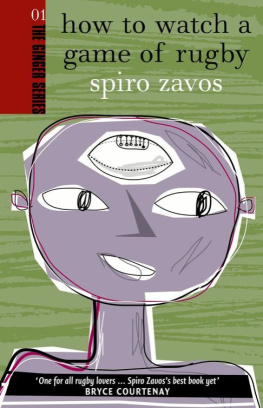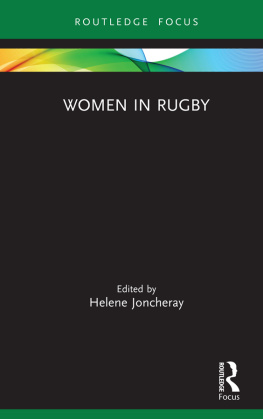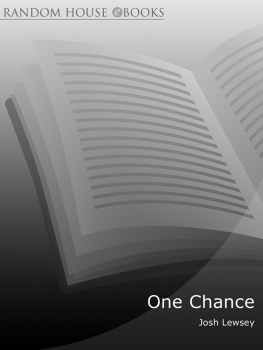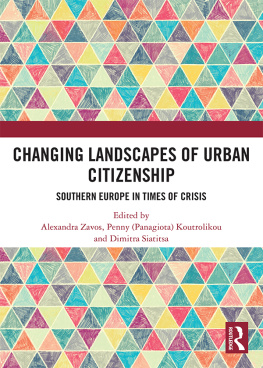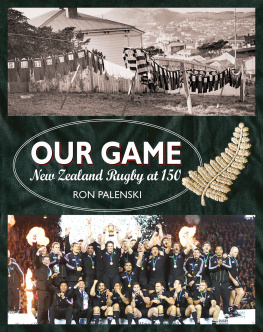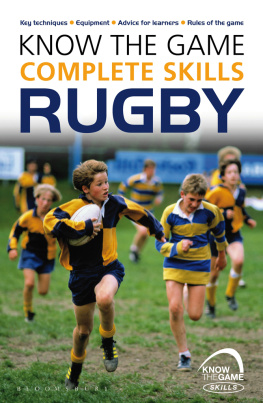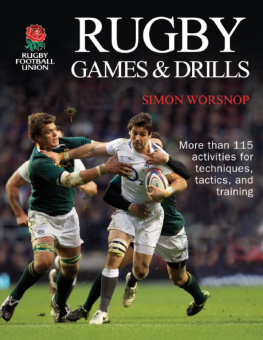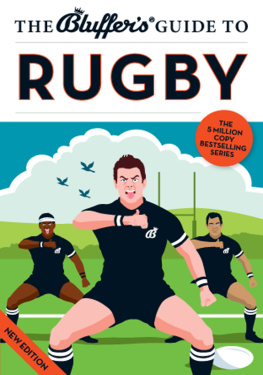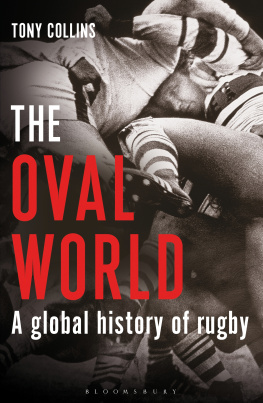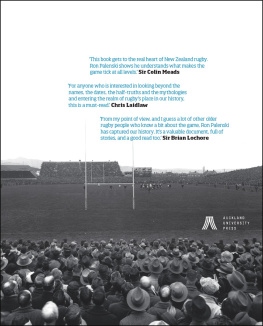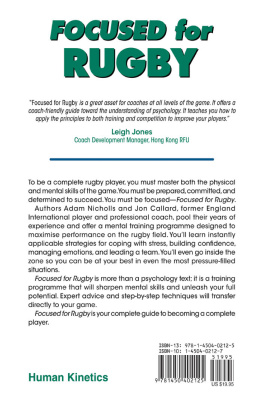Spiro Zavos - How to Watch a Game of Rugby
Here you can read online Spiro Zavos - How to Watch a Game of Rugby full text of the book (entire story) in english for free. Download pdf and epub, get meaning, cover and reviews about this ebook. year: 2012, publisher: Awa Press, genre: Children. Description of the work, (preface) as well as reviews are available. Best literature library LitArk.com created for fans of good reading and offers a wide selection of genres:
Romance novel
Science fiction
Adventure
Detective
Science
History
Home and family
Prose
Art
Politics
Computer
Non-fiction
Religion
Business
Children
Humor
Choose a favorite category and find really read worthwhile books. Enjoy immersion in the world of imagination, feel the emotions of the characters or learn something new for yourself, make an fascinating discovery.
- Book:How to Watch a Game of Rugby
- Author:
- Publisher:Awa Press
- Genre:
- Year:2012
- Rating:4 / 5
- Favourites:Add to favourites
- Your mark:
- 80
- 1
- 2
- 3
- 4
- 5
How to Watch a Game of Rugby: summary, description and annotation
We offer to read an annotation, description, summary or preface (depends on what the author of the book "How to Watch a Game of Rugby" wrote himself). If you haven't found the necessary information about the book — write in the comments, we will try to find it.
How to Watch a Game of Rugby — read online for free the complete book (whole text) full work
Below is the text of the book, divided by pages. System saving the place of the last page read, allows you to conveniently read the book "How to Watch a Game of Rugby" online for free, without having to search again every time where you left off. Put a bookmark, and you can go to the page where you finished reading at any time.
Font size:
Interval:
Bookmark:
SPIRO ZAVOS, a first-generation Greek New Zealander, saw his first rugby test in 1949 at Wellingtons Athletic Park when he was twelve years old and was struck with a lifelong passion for the perfect game. He has written six acclaimed books on rugby, and his rugby column in the Sydney Morning Herald is a talking point for rugby followers on both sides of the Tasman. He lives in Sydney with his wife, teacher and childrens book author Judy Zavos. The couple has two sons, Zolton and Zachary.
Quotations and information have been taken from the following books and newspapers: Muddied Oafs: The Last Days of Rugger by Richard Beard (Yellow Jersey Press, 2003); Take the Ball and Run: A Rugby Anthology selected by Godfrey Smith (Pavilion Books, 1996); Art and Its Objects by Richard Wollheim (Cambridge University Press, 1992); A Mans Country? by Jock Phillips (Penguin New Zealand, 1987); History of New Zealand Rugby by A.C.Swan (Moa Publications, 1992); Pick Me Up and Run by David ONeil (1995); The World of Rugby: A History of Rugby Union Football by John Reason and Carwyn James (BBC, 1979); The Sydney Morning Herald; The Australian; The Dominion Post; The Sunday Telegraph (UK) and The Daily Telegraph (UK).
After the Final Whistle
The Real Muldoon
Crusade: Social Credits drive for power
Faith of Our Fathers
The Gold & The Black: The rugby battles for the Bledisloe Cup, New Zealand vs. Australia, 190394
Winters of Revenge: The bitter rivalry between the All Blacks and the Springboks
Ka Mate! Ka Mate! New Zealands conquest of British rugby
The Golden Wallabies: The story of Australias rugby world champions
Two Mighty Tribes: The story of the All Blacks vs. the Wallabies (with Gordon Bray)
Rugby is a wonderful concoction of ballet, opera and bloody murder.
Actor Richard Burton
On a blustery Saturday afternoon (it was Wellington, after all) in 1970, I trudged up to Athletic Park to watch the final All Blacks trial to select a team to go to South Africa. With me was my partner and later my wife, Judy. The day before, I had met Chris Laidlaw in the Grand Hotel. There, in the main bar, with the cigarette smoke curling into the thick, beer-stinking air, with the good old boys in their cardigans and blazers leaning on the wet woodwork gossiping about who was going to be selected and who was out, he told me that he was determined to win back his All Black place from Sid Going.
Laidlaw had been at Oxford on a Rhodes Scholarship and Going was now the incumbent New Zealand halfback. They didnt get on well together, Laidlaw told me. Going, a wary Mormon, with a brilliant running game, was angry that the worldly Laidlaw, who was the best passing halfback of his or any other era, seemed to be returning to New Zealand like a prodigal son to reclaim his lost inheritance. The man-on-man battle between these two adversaries was one of the games-within-the-game I was interested in watching.
I was also intrigued about the eventual selection of the All Blacks. The coach, Ivan Vodanovich, was a good friend of mine. Ivan had come to Wellington from the King Country, bulked up, developed his scrumming skills and played for the All Blacks in the front row against Australia in 1955. After his playing career was over he had, as so many All Blacks had done over the decades, put his energies into administration and coaching.
I used to ear-bash him with theories about backline play (the fly half shouldnt start running forward until the halfback had actually passed the ball) and how a team should be prepared in the week of a big match. My theory here was that training should be tapered off, especially on the Thursday and Friday, so that players were full of energy, like a charged-up battery, on Saturday.
Ivan disagreed. The year before, he had trained the All Blacks relentlessly on the Friday before the test. It was so hot he had taken his jersey off and the sweat had poured down his massive chest as he yelled and needled the All Blacks into doing their drills with more and more pace and energy. The next day the All Blacks played a brilliant first half against Wales and then faded in the second as I had predicted, to win comfortably but not overwhelmingly, as they could have.
Missing from the trial squads was another friend of mine, Ken Gray. A thoughtful man, with brooding, sunken eye sockets and a sophisticated social conscience, Ken had walked down Manners Street one night before Christmas, when the streets were glistening with rain, and told me he was retiring because his detestation of the apartheid regime in South Africa was so intense he could not bring himself to set foot in the country, not even as a rugby player. He wanted to retire rather than make a statement about his unavailability on moral grounds. I dont want to embarrass Chris and Pinetree [Colin Meads] and Brian Lochore, he told me.
Ken was the rock of the All Black pack of the late 1960s (one of the best teams New Zealand has ever put on to a field). Another of the intriguing questions that had to be answered during the trial was whether there was another player who could adequately replace him.
There were other questions, too. Who would be the bolter in the squad? Teams selected for major tours in this era often included players whose names elicited gasps when they were read out. Grant Batty, perhaps? Batty had been a brilliant schoolboy player. Earlier that year I had sat with the famous rugby broadcaster Winston McCarthy at Athletic Park and watched his debut as a senior. This boy, McCarthy told me, in a voice that, in Tony OReillys words, rasped like two mating pieces of sandpaper, is the most exciting New Zealand back since Bert Cooke. As Cooke, a 1920s All Black, is regarded as the greatest inside back New Zealand rugby has produced, the compliment was extravagant.
Ivan Vodanovich had told me that if Batty played through the trial, he would be selected. In fact, he limped off the field towards the end and had to be replaced.
There was some interesting off-field action to look forward to as well. A radical activist I had known at university had told the newspapers he was going to douse himself with petrol and set fire to himself on the halfway mark before the main trial as a protest against apartheid and the tour to South Africa.
The trial match, therefore, had many points of interest for the keen observer like me to watch out for. And as there is with every game of rugby, whether it is played on a suburban park with a handful of spectators, or at one of the great rugby stadiums with huge crowds, there was, as well, the theatre of the game and its tribal imperatives. Australian supporters screaming out, Tackle, Wallabies, tackle! or New Zealand supporters singing out, Black, black, black! (or, to un-Kiwi ears, Blek, blek, blek!) are sounds of a healthy society with its priorities right. It is much better to make tackles than to make war.
With all these emotions and thoughts roiling around in my subconscious, my heart was beating fiercely as the two trial teams, the Probables in black jerseys and the Possibles in white jerseys, trotted onto the clumpy, windswept grass of Athletic Park. At that moment, Judy bent down and pulled the latest issue of Time magazine from her bag. She steadfastly read her way through it while the players were vying for the prize of their lives and the spectators were going through emotional ups and downs with the fluctuating fortunes of their favourite players.
A month or so later, on the night of our wedding, a group of male friends joined me in the bedroom of our hotel to listen to (you dont have to be at the ground to watch a rugby match) the radio broadcast of the second test between the Springboks and the All Blacks from South Africa. Chris Laidlaw had won back his halfback position, and played shrewdly and effectively to guide the tourists to a vital victory. We (the men) were ecstatic. Judy, though, was not amused.
Font size:
Interval:
Bookmark:
Similar books «How to Watch a Game of Rugby»
Look at similar books to How to Watch a Game of Rugby. We have selected literature similar in name and meaning in the hope of providing readers with more options to find new, interesting, not yet read works.
Discussion, reviews of the book How to Watch a Game of Rugby and just readers' own opinions. Leave your comments, write what you think about the work, its meaning or the main characters. Specify what exactly you liked and what you didn't like, and why you think so.

